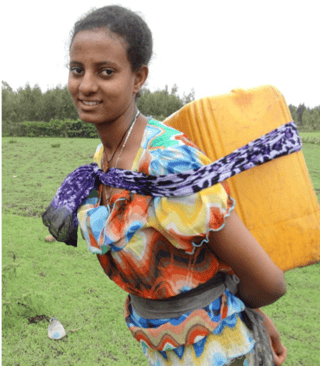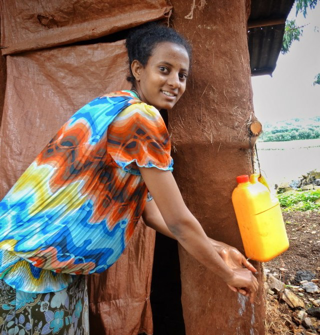 |
| Guale carries clean water home |
“My life now and before is like heaven and the earth. Incomparable!” says Guale, a 15-year-old girl in 8th grade, who aspires to be a successful business woman. Guale and her family live in Gondar, a historic Ethiopian city located 730 kilometers (454 miles) north of the capital of Addis Ababa.
Guale says, “Being the middle girl in the family, I carried a burden on my shoulder. I used to have a hectic life, filled with routine tasks expected of me. I live in a large extended family and all females in the house work tirelessly,” she says. “I would wake up as early as 4am and together with my mother, sister and niece we go to fetch water from the spring or manually dug borehole. The time we get back home is determined by the number of people who have reached there before us,” said Guale. “And once animals are out, it was difficult to get water because they make it dirty. I and my family drank this water all our life and we have always been sick for a reason we never knew until recently,” she said. Until World Vision entered the community, Guale and her family lacked clean water or an awareness about sanitation and hygiene.
Guala’s father, Agegnehu Mekuanent (64) says, “We used to say, people get sick and die because of bad luck... Not knowing the source of the problem, we have suffered a lot. People and animals open defecate and harmful worms are created on the ground. Our cattle eat from the ground and get infected from the ground worms. Whenever we eat from chicken and cattle or get milk from infected cow, we soon get sick of helminthic disease. Thanks to the training World Vision gave me, I now know all of this.”
 |
| Guale washes her hands using a tippy tap |
World Vision constructed a shallow well, providing clean water access to the community but that did not eliminate the problem. The community continued to suffer from the consequences of open defecation. World Vision stepped up to provide intensive training to the community on the importance of sanitation and hygiene. The training included construction of their own latrine and production of slabs used for latrines. In collaboration with the local health bureau, World Vision made home visits and gave sanitation advice. Today this community has been declared Open Defecation Free!
Guale and her family now have access to clean water, half a kilometer away from their house and they have constructed their own Ventilated Improved Pit (VIP) latrine. “Fetching water is still part of my daily routine. However, I don’t have to get up early morning… Above all, instead of carrying the dirty water that brought sickness into my family, I carry home clean water,” said Guale. “We no more suffer from the waterborne diseases. ...having a latrine in our compound helps a lot. We wash before and after using latrine and also keep it clean. For this I say my life has changed. I am focused on my education to score good grades,” she says.







